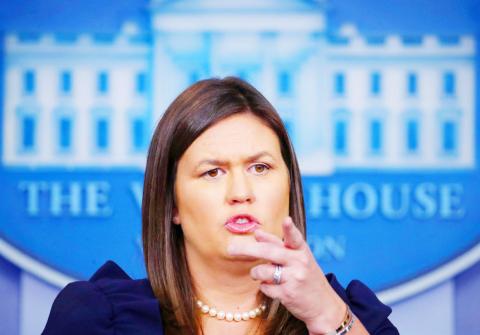The White House late on Thursday cautioned China against luring away Taiwan’s allies, in the latest sign that trade friction between Washington and Beijing is expanding into a broader struggle for global clout.
In a harshly worded statement, White House press secretary Sarah Huckabee Sanders said that the US would rethink relations with El Salvador after the Central American nation this week cut ties with Taipei in favor of Beijing.
The US would seek to deter Chinese efforts to forge new diplomatic bonds in the region, Sanders said.

Photo: AP
“The El Salvadoran government’s receptiveness to China’s apparent interference in the domestic politics of a Western Hemisphere country is of grave concern to the United States, and will result in a re-evaluation of our relationship with El Salvador,” she said. “The United States will continue to oppose China’s destabilization of the cross-strait relationship and political interference in the Western Hemisphere.”
While the statement mentioned no specific action, it represented a potentially significant shift in the US’ posture toward China.
The western hemisphere reference evoked the US’ historical claim to a sphere of influence over North and South America under the Monroe Doctrine, which then-US secretary of state John Kerry in 2013 declared “over.”
El Salvador was the third Central American nation to recognize Beijing in two years, leaving Taipei with only 17 diplomatic allies.
The Presidential Office yesterday thanked the US for “speaking out for justice.”
“Taiwan is grateful to the US authorities, including the White House, government and Congress, for the remarks they made in favor of Taiwan” after El Salvador switched recognition to China, Presidential Office spokesperson Alex Huang (黃重諺) said in a statement.
“Protecting the country’s sovereignty and dignity, strengthening our self-defense and safeguarding our free and democratic lifestyle is our bottom line, which is also an internationally recognized value,” Huang quoted President Tsai Ing-wen (蔡英文) as saying. “Taiwan will not yield to China’s intimidation and will continue to contribute to the stabilization and the forces of good in the region.”
Separately, Tsai met with former US Pacific Fleet commander Admiral Scott Swift in Taipei yesterday.
She thanked Swift, the US Congress and US government for their support, and said she hoped for regular arms sales to Taiwan, as well as more exchanges on autonomous defense capabilities.
Maintaining security and stability in the Taiwan Strait and in the region is a goal that the two countries share, Tsai said.
As China’s suppression of Taiwan continues to increase, Taipei should work closely with the US and other nations that have similar beliefs, and play a more active role in regional security, she said.
Apart from boosting military exchanges between the US and Taiwan, Swift’s visit was evidence of the strong partnership between the two nations, Tsai said.
This month, US President Donald Trump signed the US National Defense Authorization Act for fiscal year 2019, she said, adding that the sections pertaining to Taiwan contain benefits that include mutual visits between officials from Taiwan and the US, Taiwan-US military exchanges and the improvement of Taiwan’s military preparedness.
Additional reporting by CNA

The CIA has a message for Chinese government officials worried about their place in Chinese President Xi Jinping’s (習近平) government: Come work with us. The agency released two Mandarin-language videos on social media on Thursday inviting disgruntled officials to contact the CIA. The recruitment videos posted on YouTube and X racked up more than 5 million views combined in their first day. The outreach comes as CIA Director John Ratcliffe has vowed to boost the agency’s use of intelligence from human sources and its focus on China, which has recently targeted US officials with its own espionage operations. The videos are “aimed at

STEADFAST FRIEND: The bills encourage increased Taiwan-US engagement and address China’s distortion of UN Resolution 2758 to isolate Taiwan internationally The Presidential Office yesterday thanked the US House of Representatives for unanimously passing two Taiwan-related bills highlighting its solid support for Taiwan’s democracy and global participation, and for deepening bilateral relations. One of the bills, the Taiwan Assurance Implementation Act, requires the US Department of State to periodically review its guidelines for engagement with Taiwan, and report to the US Congress on the guidelines and plans to lift self-imposed limitations on US-Taiwan engagement. The other bill is the Taiwan International Solidarity Act, which clarifies that UN Resolution 2758 does not address the issue of the representation of Taiwan or its people in

US Indo-Pacific Commander Admiral Samuel Paparo on Friday expressed concern over the rate at which China is diversifying its military exercises, the Financial Times (FT) reported on Saturday. “The rates of change on the depth and breadth of their exercises is the one non-linear effect that I’ve seen in the last year that wakes me up at night or keeps me up at night,” Paparo was quoted by FT as saying while attending the annual Sedona Forum at the McCain Institute in Arizona. Paparo also expressed concern over the speed with which China was expanding its military. While the US

SHIFT: Taiwan’s better-than-expected first-quarter GDP and signs of weakness in the US have driven global capital back to emerging markets, the central bank head said The central bank yesterday blamed market speculation for the steep rise in the local currency, and urged exporters and financial institutions to stay calm and stop panic sell-offs to avoid hurting their own profitability. The nation’s top monetary policymaker said that it would step in, if necessary, to maintain order and stability in the foreign exchange market. The remarks came as the NT dollar yesterday closed up NT$0.919 to NT$30.145 against the US dollar in Taipei trading, after rising as high as NT$29.59 in intraday trading. The local currency has surged 5.85 percent against the greenback over the past two sessions, central